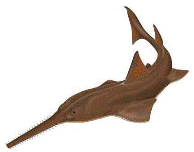Papers in the Biological Sciences

Investigations of the Ichthyofauna of Nicaraguan Lakes
Date of this Version
1976
Abstract
Previous studies of parent-young interactions in cichlid fish have established some of the details of such relations, but have raised, or left unanswered many questions. In particular, there are questions as to the recognition of parents and young by each other, and to what extent learning might be involved in such recognition.
Based on observations of exchanges of parents between families of Cichlasoma citrinellum, we suggest that parents learn to recognize young during each parental cycle. They appear to have a moderately short term memory for recognition of young, and accept young corresponding to this memory.
Parental fish accept conspecific fry younger than, or the same age, but not those older than their own. Successive presentations of young fry maintained parental behavior for much longer than normal. Changes in color pattern, and some aspects of parental behavior are described.


Comments
Published in INVESTIGATIONS OF THE ICHTHYOFAUNA OF NICARAGUAN LAKES, ed. Thomas B. Thorson (University of Nebraska-Lincoln, 1976). Copyright © 1976 School of Life Sciences, University of Nebraska-Lincoln.